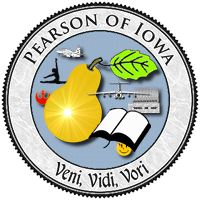Howdy,
Glad to help. Most answers are shown with the questions.
I was a recon pilot in Vietnam. I was based at Pleiku, Vietnam and Nakom Phanom, Thailand. I flew missions in Vietnam, Laos, and Cambodia.
After I returned to the U.S., I flew transport missions to Vietnam monthly. I few enough of these to be credited with a second tour.
Let me know if you have any other questions.
Mike
Glad to help. Most answers are shown with the questions.
I was a recon pilot in Vietnam. I was based at Pleiku, Vietnam and Nakom Phanom, Thailand. I flew missions in Vietnam, Laos, and Cambodia.
After I returned to the U.S., I flew transport missions to Vietnam monthly. I few enough of these to be credited with a second tour.
Let me know if you have any other questions.
Mike
Michael L. Pearson
1907 Oak Knolls Ct SE
Cedar Rapids, IA 52403
mlpearso@aol.com
H: (319) 362-1023 C: (319) 573-9188
1907 Oak Knolls Ct SE
Cedar Rapids, IA 52403
mlpearso@aol.com
H: (319) 362-1023 C: (319) 573-9188
From: Toby and Elaine JORDAN <rejordan79@msn.com>
Sent: Mon, May 10, 2010 9:23 am
Subject: Alex needs some Homework Assistance!
Hey all - last week Alex got an assignment in U.S. History & asked us to help him find some people to answer some questions. We as parents totally spaced and forgot about it! The assignment is due Wednesday morning, so if you are able to help by either answering the questions or finding/knowing someone that can, we'd appreciate it if you could just e-mail back the answers to us by Tuesday night so he has time to put everything together into a report.
Alex needs to ask questions of a Veteran from each of these 3 wars: Vietnam War, Korean War, World War II
The questions are:
1) Why did the U.S. enter the war?
2) What were the goals of the war?
3) How were you treated by people when they learned you were in the service?
4) How were you treated in uniform?
5) How were you received in the countries where you fought?
6) Do you feel the government was honest about its war goals?
8) Has the government shown its appreciation for your wartime efforts? If so, how?
Alex needs to ask questions of a Veteran from each of these 3 wars: Vietnam War, Korean War, World War II
The questions are:
1) Why did the U.S. enter the war?
Big Picture Answer: to stop the spread of Communism. Communism was making gains in Europe, Africa, Latin America, and Asia. George F. Kennan sent a message, known as The Long Telegram, to the State Department (1946), followed by an anonymous article in Foreign Affairs magazine that outlined the "Containment Strategy" which became the official plan for the conduct of the Cold War. There was a fear that, if the Communist expansion was to continue, all of SouthEast Asia would "fall like dominoes."
Public opinion was greatly influenced by two popular books at that time:
1) The Night They Burned the Mountain (1960), by Tom Dooley, a medical missionary in Laos, and
2) The Ugly American (1959), by Eugene Burdick and David Lederer.
These books described the injustices going on in SouthEast Asia and the failures of U.S. foreign policy. They raised the idea that "something must be done."
Shorter Answer: Muddling through. France had tried to regain Indochina, including Vietnam after WW II. They failed, losing the key battle at Dien Bien Phu. They asked the U.S. to take over. Eisenhower agreed. Kennedy introduced military advisors. Johnson expanded to a full scale war, using the dubious Gulf of Tonkin incident as his excuse.
Public opinion was greatly influenced by two popular books at that time:
1) The Night They Burned the Mountain (1960), by Tom Dooley, a medical missionary in Laos, and
2) The Ugly American (1959), by Eugene Burdick and David Lederer.
These books described the injustices going on in SouthEast Asia and the failures of U.S. foreign policy. They raised the idea that "something must be done."
Shorter Answer: Muddling through. France had tried to regain Indochina, including Vietnam after WW II. They failed, losing the key battle at Dien Bien Phu. They asked the U.S. to take over. Eisenhower agreed. Kennedy introduced military advisors. Johnson expanded to a full scale war, using the dubious Gulf of Tonkin incident as his excuse.
2) What were the goals of the war?
To contain Communism and prevent the Domino Effect
3) How were you treated by people when they learned you were in the service?
Very well.
4) How were you treated in uniform?
Very well. But I was almost always in or near a military base.
5) How were you received in the countries where you fought?
Very well. I did not interact much with the people in Vietnam. In Thailand, the people were half pro-US and half pro-Ho Chi Minh. But they treated us well because we were the big dog with lots of power and money.
6) Do you feel the government was honest about its war goals?
For the most part. The Gulf of Tonkin incident was phony, but the strategy had been well laid out.
The tactical strategy prevented a military victory, out of fear of the Chinese and Soviets.
The press continually mis-characterized what was going on. Especially, Cronkite.
7) How did you feel when the war ended?
The tactical strategy prevented a military victory, out of fear of the Chinese and Soviets.
The press continually mis-characterized what was going on. Especially, Cronkite.
Glad to get out of it. It was a waste without a victory strategy.
8) Has the government shown its appreciation for your wartime efforts? If so, how?
I got some medals (Distinguished Flying Cross and 5 Air Medals).
I got paid every month.
I got paid every month.
That's all I expected.
Thank you so much for helping! - Alex, Toby & Elaine


No comments:
Post a Comment